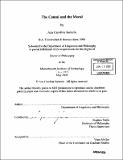The causal and the moral
Author(s)
Sartorio, Ana Carolina, 1972-
DownloadFull printable version (5.598Mb)
Other Contributors
Massachusetts Institute of Technology. Dept. of Linguistics and Philosophy.
Advisor
Stephen Yablo.
Terms of use
Metadata
Show full item recordAbstract
My dissertation is about the following two questions: The causal question: When is something a cause of something else? The moral question: When is someone morally responsible for something? I examine the way in which these questions overlap. I argue that, in some important respects, the relation between the causal and the moral question is tighter than people have taken it to be, but, in other important respects, it is looser than people have taken it to be. The dissertation consists of three chapters. Each of the chapters is a self-contained paper, but the three papers are interconnected in various ways. Chapters 1 and 2 are concerned with how the causal question and the moral question intersect, and Chapter 3 is concerned with how they come apart. In Chapter 1, I lay out a view of causation according to which causing is a particular way of making a difference. I show that an advantage of this view is that it carves up a concept of cause that is particularly well suited for the work causation does in moral theory. In Chapter 2, I argue that a moral asymmetry that exists between actions and omissions has a causal basis. I argue that the conditions under which actions and omissions make us morally responsible are different, and that this is so because the causal powers of actions and omissions are different. In Chapter 3, I argue against the received view about the relation between causation and moral responsibility, according to which being responsible for something requires causing it. I offer an alternative picture according to which causation is a necessary condition for the transmission of responsibility, although not for the existence of responsibility itself.
Description
Thesis (Ph. D.)--Massachusetts Institute of Technology, Dept. of Linguistics and Philosophy, 2003. Includes bibliographical references (p. 91-92).
Date issued
2003Department
Massachusetts Institute of Technology. Department of Linguistics and PhilosophyPublisher
Massachusetts Institute of Technology
Keywords
Linguistics and Philosophy.